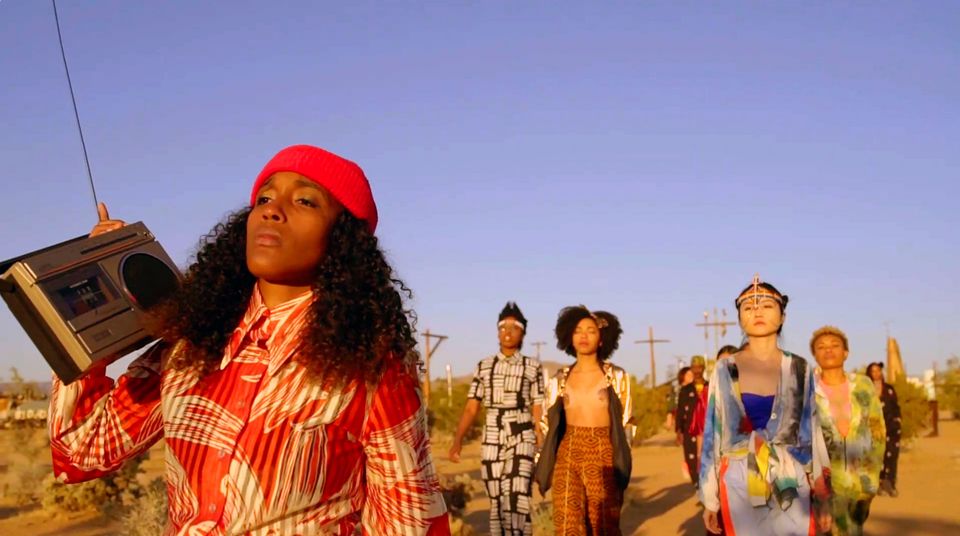“Musical Thinking: New Video Art and Sonic Strategies” Explores the Intersection of Video and Music by Today’s Leading Contemporary Artists
Exhibition Includes Recent Major Acquisitions
“Musical Thinking: New Video Art and Sonic Strategies” explores the powerful resonances between recent video art and popular music through 29 powerful artworks by 10 of today’s leading contemporary artists. By bringing musical strategies and insights into their time-based media artworks, the featured award-winning creators powerfully address personal as well as shared aspects of contemporary life, exploring foundational ideas of the United States through rhythm and counterpoint.
“Musical Thinking” is on view from June 23 through Jan. 29, 2024, at the museum’s main building in Washington, D.C. The exhibition is organized by Saisha Grayson, curator of time-based media at the Smithsonian American Art Museum, with support from Anne Hyland, curatorial assistant.
“We welcome all to this uniquely immersive exhibition and encourage visitors to reconvene around art, share space and move—and be moved—together,” said Stephanie Stebich, the Margret and Terry Stent Director at the Smithsonian American Art Museum. “At this present moment when connecting across difference seems ever more important, ‘Musical Thinking’ is the latest in a series of projects at SAAM that highlight artists working from a variety of perspectives and experiences that will surely resonate with our ever-diverse audiences.”
“Musical Thinking” celebrates major new acquisitions with 16 of the 29 artworks newly added to the museum’s permanent collection. The exhibition pairs video works by ADÁL, Raven Chacon, Mariam Ghani, Martine Gutierrez, Arthur Jafa, Erin Ellen Kelly, Christine Sun Kim, Liz Magic Laser, Simone Leigh and Cauleen Smith with related photographs, sculptures, prints and immersive installations by the same creators on loan from the artists, museums and private collections.
Music is central—not an afterthought—to the moving-image work of the 21st-century artists featured in the exhibition. They bring musical thinking to their creative process—employing scores, thematic improvisation and performer interpretation—and to their selection of songs, styles and structures that embed meanings from musical traditions. The artists in “Musical Thinking” turn to early spirituals, jazz and mid-century musicals, movie soundtracks, hip-hop and even lullabies to deeply consider the traditions, methods and purpose of music in daily life. Connecting innovative forms, past and present, they emphasize that the story of the United States has always been complex, multivocal and set to music.
“Music is often a way of establishing common ground; it is woven into our daily lives, our everyday spaces, and our stories of ourselves and our communities,” Grayson said. “This is why SAAM’s first time-based media exhibition since 2015 is organized around this theme. The artists featured in ‘Musical Thinking’ use music to amplify aspects of American life and to take on vast swaths of history and to interrogate the country’s foundational constructs. The exhibition becomes an invitation to consider the relationship between the country’s past, present and future though this sonic frame.”
For the first time, the museum has created a fully accessible exhibition with an inclusive design that emphasizes the multisensory and social aspects of music with soundscapes that wrap around the space. These music-infused works have the potential to transform individual visitors into communities that share a moment and move in sync in the galleries.
The museum collaborated with Motion Light Lab at Gallaudet University in Washington, D.C., to develop layered experiences particularly accessible for Deaf and hard-of-hearing audiences, and available to all visitors. Benches in black box galleries conduct enhanced vibrations to allow physical appreciation of the unique soundtrack in each video, and the light-up, haptic dancefloor designed in conversation with artist Gutierrez encourages audiences to feel, see and participate in the experience she creates in her work “Clubbing.” Audio notes on the wall or open captions below the projection are included for each installation. QR codes under the main artist labels offer a choice to access videos with American Sign Language translation for the interpretive texts or written verbal descriptions of that section for those who use screen readers. At each entrance, visitors can find sensory maps to navigate an exhibition with varying intensities of light, sound and subject matter. A full accessibility guide for the exhibition will be available on the museum’s website.
Digital Publication
A digital catalog, written by Grayson and published by Smithsonian Institution Scholarly Press, accompanies the exhibition. In two essays, Grayson explores intersections and influences of video and music, focusing on recently made works by some of the most important voices in contemporary art today, and on the theme of musical thinking in the museum’s historical time-based media collections. Between these, the “Liner Notes” section offers close readings of works in the exhibition. The publication will be available for free digital download as a screen reader on the museum’s website.
Free Public Programs
Museum staff have organized a series of free public programs in conjunction with the exhibition. Gallery talks include Ariel Evans, the William H. Truettner Postdoctoral Fellow, discussing Christine Sun Kim’s “The Star-Spangled Banner (Third Verse)” Friday, June 23, at 12:15 p.m.; Dan Finn, time-based media conservator, leads a conservation-focused tour through the exhibition Friday, July 7, at 5:30 p.m.; and Grayson will take visitors on a gallery tour Friday, Sept. 22, at 4:30 p.m.
The museum’s annual exploration of video games and art, SAAM Arcade 2023, will explore many of the same themes on display in “Musical Thinking.” The in-person event is Saturday, July 22, from 11:30 a.m. to 7 p.m.
Artist Cauleen Smith will give an in-person talk Wednesday, Sept. 13, at 6:30 p.m. as part of the museum’s annual Clarice Smith Distinguished Lecture Series. Registration is required. The talk will be livestreamed on the museum’s YouTube channel and an archive version will be available after the event.
Artist Raven Chacon will conduct a concert of his scores, followed by a panel discussion with the performers Saturday, Nov. 4, at 2 p.m. in the Rasmuson Theater of the Smithsonian’s National Museum of the American Indian in Washington, D.C. Registration is required for this event that is co-presented with the National Museum of the American Indian.
Artists Mariam Ghani and Erin Ellen Kelly will perform in January 2024 details and registration information to come on the museum’s website.
Details about these programs and additional events are available on the museum’s website at AmericanArt.si.edu/events.
Credit
“Musical Thinking: New Video Art and Sonic Strategies” is organized by the Smithsonian American Art Museum. Generous support has been provided by Michael Abrams and Sandra Stewart, Aida Alvarez, Candy and Michael Barasch, Carolyn and Mo Cunniffe, Roger S. Firestone Foundation, Ed and Kathy Fries, Elizabeth Firestone Graham Foundation, Pamela and David Hornik, Maureen and Gene Kim, Nion McEvoy Publications Endowment, Victoria McManus, V. Joy Simmons, M.D., Smithsonian Accessibility Innovation Fund, Lucille and Richard Spagnuolo, Helen and Peter Warwick and the SJ Weiler Fund.
This exhibition received federal support from the Smithsonian American Women’s History Initiative Pool, administered by the Smithsonian American Women’s History Museum, and the Asian Pacific American Pool, administered by the Smithsonian Asian Pacific American Center.
About the Smithsonian American Art Museum and its Renwick Gallery
The Smithsonian American Art Museum is the flagship museum in the United States for American art and craft. It is home to one of the most significant and inclusive collections of American art in the world. The museum’s main building, located at Eighth and G streets N.W., is open daily from 11:30 a.m. to 7 p.m. The museum’s Renwick Gallery, a branch museum dedicated to contemporary craft, is located on Pennsylvania Avenue at 17th Street N.W. and is open daily from 10 a.m. to 5:30 p.m. Check online for current hours and admission information. Admission is free. Follow the museum on Facebook, Instagram, LinkedIn and YouTube. Smithsonian information: (202) 633-1000. Museum information (recorded): (202) 633-7970. Website: americanart.si.edu.















